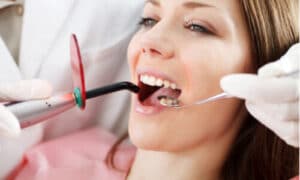Do you want to have that Hollywood smile that everyone has been gushing about? What you need are porcelain dental veneers. It is one of the most sought-after dental restoration procedures that are popular for models and actors. Because of its proven benefits, porcelain veneers are a fantastic option for those looking to boost their confidence. It improves your smile and drastically upgrades your appearance, making it one of the leading procedures in cosmetic dentistry. Aside from the advantages of a promising dental aesthetic, what else do porcelain veneers have to offer? Read further to learn more.
What Are Porcelain Dental Veneers?
Porcelain veneers, as its name implies, are made from very thin layers of porcelain. This material is known to bond with your teeth’ surface, which will then replicate the light-reflecting qualities of a natural tooth. It shows off a translucent and radiant-looking vibe, resulting in an attractive and appealing smile.
Typically, porcelain veneers offer an instant transformation of your teeth’ shape, size, and colour. It is often the treatment of choice for addressing the following issues:
- Yellow teeth or other forms of discolouration.
- Teeth that have been wearing down due to aging.
- Presence of chip, crack or fracture in the teeth.
- Slightly misaligned teeth.
- Irregular or uneven formation of teeth structure.
- Fixing gaps between teeth or diastema.
What to Expect During Porcelain Veneers Treatment?
If you are wondering what to expect when having porcelain veneers, here is a step-by-step guide on how the procedure occurs.
1. Initial Consultation
 Like most cosmetic dentistry procedures, consultation is the initial step in getting porcelain veneers. During this time, the dental staff will take x-rays, photographs, and a dental impression of your teeth. With these results, the cosmetic dentist will inspect your teeth, analyze your oral situation, and provide you with treatment choices.
Like most cosmetic dentistry procedures, consultation is the initial step in getting porcelain veneers. During this time, the dental staff will take x-rays, photographs, and a dental impression of your teeth. With these results, the cosmetic dentist will inspect your teeth, analyze your oral situation, and provide you with treatment choices.
The results of the final evaluation will dictate the most viable treatment plan for your concern. After choosing a specific procedure, your dentist will further discuss the details of the treatment. Then, through a series of explanations, the pros and cons of the process are weighed down.
2. Mock-up Veneers
As you proceed with the porcelain veneers procedure, your dentist will build a mock-up of the intended veneers. You will see and approve this figure at your next appointment, so you’ll know what possible outcomes to expect. After your approval, the dentist will proceed to the next phase of the treatment.
3. Teeth Preparation
Dental veneers require minor adjustments on your teeth. Most of the time, the excess enamel surfaces are scraped off. Doing so allows more space for the porcelain veneers to fit in the teeth.
4. Dental Impression
After all of your teeth have been prepped, the dentist can now make a dental imprint of your teeth. Your dentist will give this impression to a porcelain veneer fabricator. The veneers cost a lot more when a different manufacturer fabricates the dental appliance.
Using the impression, the dental laboratory will start fabricating the veneers. Often, they do so by building up numerous layers of porcelain to create your veneers. To further improve the durability of these veneers, it undergoes baking in a special oven.
5. Temporary Veneers
While waiting for your veneers, the dentist will place temporary veneers for your protection. These veneers cost much less than normal ones as they exist with a generic fit. Therefore, it is only useful to prevent sensitivity as your real veneers are still with the manufacturer.
6. Fitting the Veneers
The fabricated veneers are ready for fitting on your next appointment. The dentist will carefully replace the temporary ones and ensure that the porcelain veneers will match well with your teeth. Any necessary changes will be taken into consideration, and ill-fitting veneers will be returned to the laboratory for correction.
7. Final Installation
The dentist will scrape off some edges of your teeth to prep the surface before installation. When the veneers are ready, a bonding chemical is separately applied to each tooth. Each veneer is cured using a special light to solidify the cement and firmly set your porcelain veneers on your teeth.
What Are the Advantages of Porcelain Veneers?
Appearance
Unlike traditional teeth whitening, porcelain veneers may be customisable to reach the tone or hue of your choice. Aside from that, they don’t fade or tarnish with time, either.
Durability
Porcelain veneers are more durable than direct composite veneers and appear more natural with regards to being translucent. Moreover, porcelain veneers are stain-resistant.
Preparation
When placed in comparison to dental crowns, porcelain veneers require less tooth preparation. It is also less invasive and preserves the bulk of the natural tooth structure.
Cost
In terms of price, porcelain veneers cost a lot less than zirconia dental crowns. However, they are also slightly more expensive than other veneer types.
Am I Qualified for Porcelain Dental Veneers?
Unfortunately, porcelain dental veneers are only applicable for those with healthy teeth. It is crucial to watch out for the following conditions:
Poor Oral Health
Veneers are not allowed for patients with tooth decay. It’s preferable to make sure your teeth are plaque-free and that any cavities undergo filling or repair first. The same goes for extensively infected teeth and untreated gum disease. A root canal treatment should be necessary to restore oral health prior to porcelain veneers for these kinds of concerns.
 Malocclusion
Malocclusion
Those with heavily crowded or misaligned teeth are not a good candidate for veneers. Orthodontic treatment should be a priority. You can opt for braces or use Invisalign clear aligners for faster improvement.
Bruxism
Porcelain veneers may not be appropriate for you if you habitually grind your teeth or have bruxism. Your porcelain veneers may break or crack if you clench on them. To preserve your veneers, you may need to wear a mouthguard at night. This method is not advisable.
Missing Teeth
Veneers aren’t the treatment of choice to repair lost teeth. Therefore, other treatments will better serve your missing teeth through a fixed dental bridge, dental implant, or denture.
Are There Alternatives for Porcelain Veneers?
- Direct composite veneers. Made of composite resin, composite veneers can hide severe stains, repair fissures, and fill gaps between teeth.
- Teeth Whitening. This procedure can brighten the colour of your teeth by two to eight shades.
- Crowns. Dental crowns are useful to repair and preserve teeth that have bad damages.
- Orthodontics. This procedure can straighten and repair teeth that are incredibly crooked or have a malocclusion.
Guaranteed Dental Care
Are you interested in having porcelain dental veneers? Look no further because here at Dentistry on Solent, we offer the best and most satisfactory dental services. Our dentists strive hard to exceed your expectations, so rest assured that you’ll get the most out of your treatment.
To know if porcelain dental veneers are right for you, we must first get an in-depth analysis of your oral health. You can call us now at (02) 9159 3783 or book your appointment for more information.





